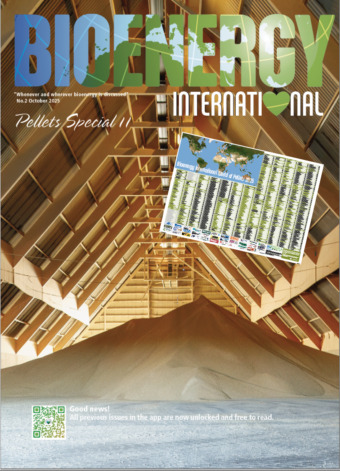Australia-headed recycling, paper and packaging major Paper Australia Pty Ltd, a Nippon Paper Group member trading as "Opal", and renewables developer European Energy Australia, a subsidiary of Danish power utility European Energy A/S, together with its subsidiary Ammongas A/S, have taken the next step in a plan to bring innovative sustainable fuel solutions to Gippsland, Victoria (VIC).
The companies have announced the beginning of a study at Opal’s Maryvale Paper Mill in Latrobe Valley, Victoria, that will assess the feasibility of capturing biogenic carbon dioxide (bioCO2) from one of its boilers.
The Maryvale facility has been operating since 1937 and manufactures unbleached kraft linerboard, fluting medium, bag and sack papers for the growing fibre packaging market in Australia and New Zealand.
The study is expected to run until mid-2026 and will assess the technical and commercial viability of capturing bioCO2 from the mill to develop e-methanol, a low-carbon fuel and alternative to fossil fuels that can be used in shipping.
Bring PtX to Australia
The aim is to capture, purify and liquify the bioCO2, which can then be used as an input for European Energy’s e-methanol manufacturing facility, or Power-to-X (PtX) plant, which could be located on the same site as the mill.
The feasibility study is part of European Energy and Ammongas’ plan to bring their PtX and carbon capture technology to Australia.
European Energy already has a PtX facility successfully operating in Kassø, Denmark, which is the world’s first large-scale e-methanol facility and also the world’s largest PtX plant.
European Energy currently supplies green methanol to companies including Maersk, Lego Group and Novo Nordisk.
European Energy Australia CEO Catriona McLeod said the company has ambitions to grow its PtX arm in Australia to complement its solar and wind farms.
This is an exciting step forward for our PtX ambitions. We’re already up and running in Denmark, and the Australian market has enormous potential to develop PtX. PtX not only offers huge potential to develop low-carbon fuel, but it could also bring huge investment and innovation to places like Gippsland, Catriona McLeod said.
Ammongas CEO Jaime Casasus-Bribian said it was an exciting opportunity to assess the feasibility for his company to use its proven expertise to advance bioCO2 capture and e-fuels in Gippsland.
Australia combines strong resources, industrial heritage, and a commitment to clean innovation, making it an ideal environment for decarbonising hard-to-abate sectors such as shipping and manufacturing. By potentially deploying our large-scale carbon capture and PtX technologies with Opal and European Energy Australia, we can unlock new value from local biogenic CO2 and drive the transition to green methanol, said Jaime Casasus-Bribian.
Ammongas currently captures, purifies and liquifies bioCO2 from the Tønder biogas plant in Denmark, which is supplied to European Energy’s Kassø PtX facility.
Opal General Manager Environment and Sustainability David Jettner said that circularity remains a focus for Opal’s business.
This study is another way to maximise the value from our use of renewable plantation wood. If the feasibility outcome is successful, it offers the potential for a multimillion-dollar investment in carbon capture in the Gippsland region, ended David Jettner.



